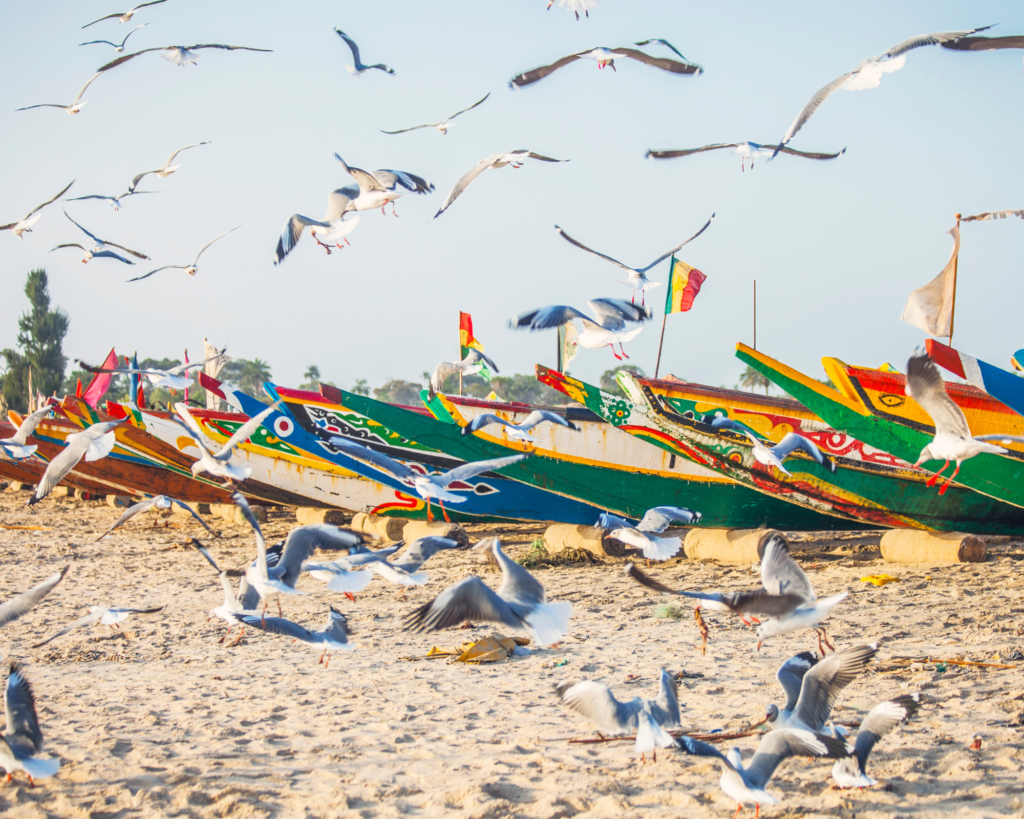
Published: May 21, 2024
On this World Fish Migration Day, as the global community comes together to celebrate the importance of migratory fish and free-flowing rivers, we must confront the harsh reality facing the West African fishing industry. Artisanal fishermen from Côte d’Ivoire to Nigeria are witnessing an unprecedented decline in fish stocks, a crisis driven by illegal fishing practices, climate change, and overfishing.
A Tradition Under Threat
For generations, communities along the Gulf of Guinea have relied on the sea for their livelihoods. Fishermen launch their wooden canoes from the beaches, seeking small pelagic fish like sardines and anchovies. These catches are crucial for local markets and for sustaining families. However, since the 1990s, a dramatic decline in fish stocks has jeopardized their way of life.
In Ghana, total landings of small pelagic fish fell by 59% between 1993 and 2019, with catches of Sardinella aurita dropping from 119,000 tonnes in 1992 to just 11,834 tonnes in 2019 . Côte d’Ivoire has experienced a similar decline, with its fish catch plummeting nearly 40% between 2003 and 2020 . The situation is dire, affecting millions who depend on fishing for survival.
The Role of Illegal Fishing
Chinese trawlers, operating under the guise of local companies, have exacerbated this crisis. Despite laws preventing foreign trawlers from fishing within national exclusive economic zones, these vessels dominate the waters, using illegal nets and destructive practices like bottom trawling. A single high-tech trawler can catch as much fish in a day as a small village fleet can in a year, depleting fish stocks and causing local fishermen to return empty-handed .
Samuel Otoo, a fisherman from Jamestown, Ghana, shares his plight: “Colleagues have drowned when their canoes have capsized in the wake of trawlers. But the Chinese don’t care.” Otoo and his partner Alfred Ofore Kae now rarely land significant catches, a stark contrast to twenty years ago when the seas were more bountiful .
Climate Change and Overfishing
Climate change further compounds the problem. Ocean warming forces fish to migrate away from equatorial currents, reducing local fish stocks. Models predict that the maximum catch potential for Ghana, Côte d’Ivoire, and Nigeria could be halved by mid-century if ocean warming continues . This decline, coupled with increased fishing efforts by local communities, has led to overfishing, further straining resources.
Traditional fishermen are also contributing to the problem. In Ghana, the number of canoes has nearly doubled from 8,000 in 1990 to 13,650 in 2017 . Many now use larger nets and outboard engines, intensifying the pressure on already depleted fish stocks.

The Human Cost
The impact on local communities is severe. In Ghana, more than 200,000 fishers and over two million others involved in the fishing value chain face dwindling incomes and food insecurity. “We are getting poorer,” says Ofore Kae. Families are forced to cope with smaller catches, higher prices, and the constant threat of hunger .
The stories of these fishermen are supported by research. A study by the Ghana Fisheries Commission shows that catches of sardinella, mackerel, and anchovies in 2019 were only 40% of what they were in 1993 . The economic strain is evident, with many communities falling deeper into poverty.
Seeking Solutions
Addressing this crisis requires a multi-faceted approach. On World Fish Migration Day, we are reminded of the importance of sustainable practices and the need for international cooperation. Stronger enforcement of fishing regulations, stricter penalties for illegal practices, and enhanced monitoring are essential steps .
Education and alternative livelihoods can also provide a path forward. Conditional cash transfers, which incentivize school attendance, can help fishing families prepare for non-fishing jobs, ensuring a more secure future .
A Call to Action
As we celebrate World Fish Migration Day, let us recognize the critical role that migratory fish play in maintaining healthy ecosystems and supporting communities. The plight of West African fishermen underscores the urgent need for collective action to protect our oceans and their inhabitants. By addressing illegal fishing, climate change, and overfishing, we can ensure that future generations will continue to benefit from the rich resources of the sea.
Let this day be a call to action for policymakers, environmentalists, and the global community to work together in safeguarding the migratory routes and habitats that are vital for the survival of fish species and the well-being of millions around the world.
Sources:





